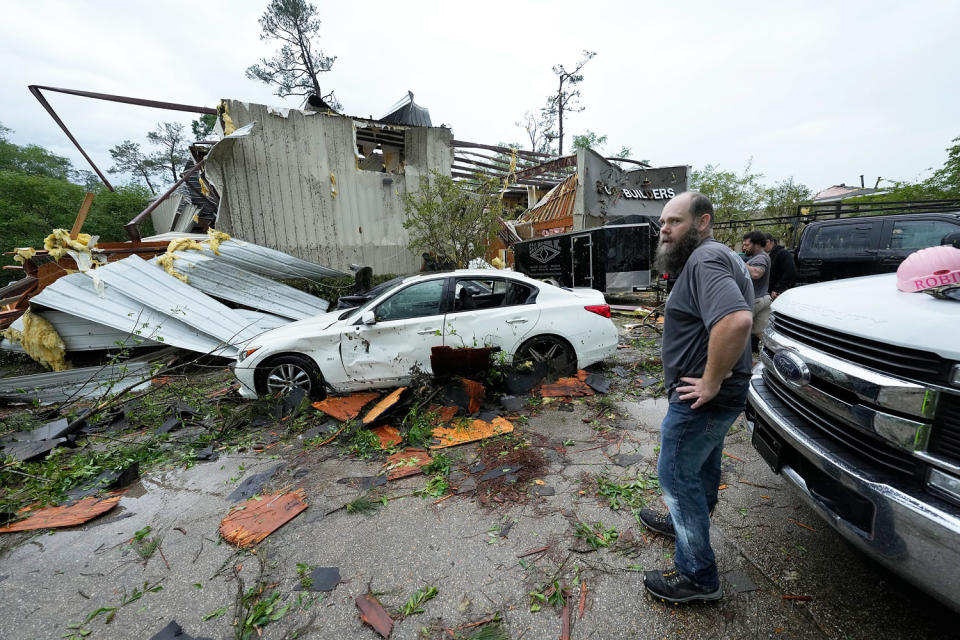Tornadoes hit Louisiana and Texas as severe weather causes damage in South
- Oops!Something went wrong.Please try again later.
A tornado with 115-mph winds ripped off roofs and tore down power lines in Lake Charles, Louisiana, on Wednesday, and another twister damaged homes in Texas as severe weather struck the South.
No deaths or injuries were reported in the EF-2 tornadoes that hit Lake Charles and Port Arthur, Texas, on Wednesday morning, the National Weather Service said.
In Lake Charles, a city of 84,000 in the southwestern part of the state, the tornado traveled for about a mile beginning at 6:38 a.m., the weather service said. The roof of the Moss Memorial Health Complex was damaged, and other roofs were destroyed.

In Port Arthur, another EF-2 tornado around 300 yards wide traveled more than 2 miles, damaging homes and ripping down trees, the weather service said.
“It was pretty bad,” Michelle Viator, of Lake Charles, told NBC affiliate KPLC. “I mean, everything’s down.”
Viator’s home was damaged, and a family down her street who have two children were trapped by the damage to their home, Viator told the station in Lake Charles.
On Tuesday, heavy rain, hail and high winds hit Mississippi and other Southern states.
Mississippi Gov. Tate Reeves announced Wednesday that there had been one weather-related death in his state, in Scott County, and an injury in Grenada County.
“Please pray for them and their families during this difficult time,” Reeves said on X.
HAPPENING NOW: The Levee in the Eastbrook Subdivision over in Yazoo City has breached here is what it looks like!@NWSJacksonMS #mswx pic.twitter.com/M4U9SEpQsT
— Chase Franks (@ChaseFranksWx) April 10, 2024
He said preliminary information was that 72 homes were damaged or destroyed in Grenada, Hinds, Marshall, Scott, Warren and Yazoo counties.
More than 4 inches of rain fell in Hinds County, Mississippi, and more than 5 inches fell in Holmes, Rankin and Sharkey counties, the weather service in Jackson said.
In New Orleans, streets flooded Wednesday. A flash flood emergency had been declared for the metro area, and the weather service there warned residents "DO NOT DRIVE right now!" New Orleans police showed images of inundated roads and urged people to avoid flooded areas.
St. Tammany Parish, on the north shore of Lake Pontchartrain across from New Orleans, shared video of destruction, including downed trees and destroyed houses and buildings, amid heavy rain.
The National Weather Service said it found damage consistent with an EF-1 tornado in Slidell near Old Spanish Trail, but it said more storm surveys would be needed to determine the path, length and wind speeds.
An EF-1 tornado also struck the Houston suburb of Katy early Wednesday with 90 mph maximum winds, officials said. While the damage survey is still ongoing, it’s consistent with an EF-1 tornado, Jeff Evans of the National Weather Service Office in Houston/Galveston told reporters.
There were more than 90 storm reports Tuesday, including reports of hail as large as 4.25 inches in diameter across Texas.
Jasper, Texas, marked 7.58 inches of rain, and 7.38 inches were clocked in Marshall, Texas, along with 7.22 inches at Big Sunflower River in Holly Bluff, Mississippi, and 6.24 inches in Monroe, Louisiana. In Kirbyville, Texas, Pin Oak Creek rose 10 feet in less than six hours.
A disaster declaration was issued for Jasper County, Texas, which includes Kirbyville, on Wednesday. The Jasper County Sheriff’s Office said the city “remains under water” Wednesday morning and rescue teams have extricated “several” people out of vehicles and homes.
By Wednesday evening, high wind advisories covered much of the South. In Birmingham, Alabama, forecasters said there could be 45 mph wind gusts, and the advisory there lasted until 7 a.m. Thursday.
Tornado watches covered an area of the Florida Panhandle and southwestern Georgia at 6:45 p.m. ET.
Around 136,000 customers across Louisiana remained without power Wednesday evening, according to the tracking website poweroutage.us.
Severe risk continues Thursday for the Ohio Valley, the Southeast and northern Florida. Thursday’s risks are lower than Wednesday’s, but all hazards will be possible for Jacksonville, Tallahassee, Tampa and other cities in Florida for the southern risk area and for Cleveland and Columbus, Ohio, and Pittsburgh across the northern risk area.
This article was originally published on NBCNews.com

